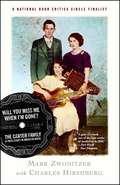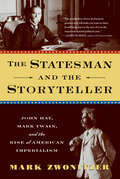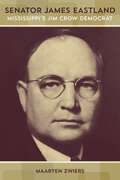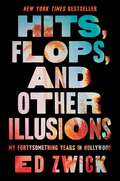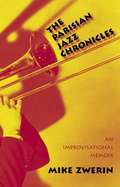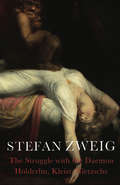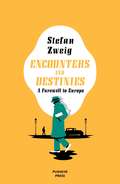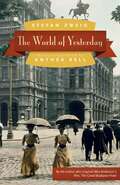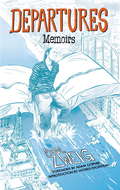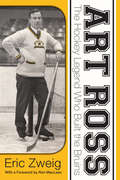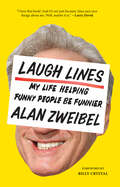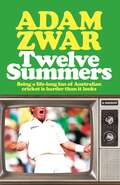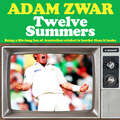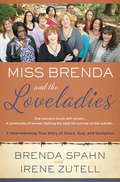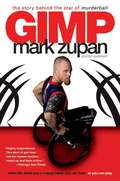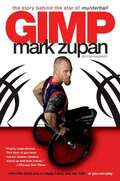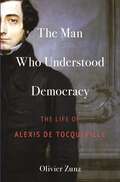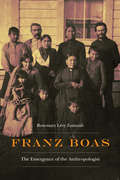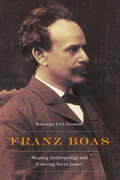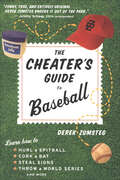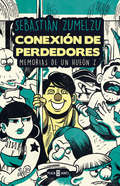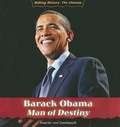- Table View
- List View
Will You Miss Me When I'm Gone?
by Mark Zwonitzer Charles HirshbergWill You Miss Me When I'm Gone? is the first major biography of the Carter Family, the musical pioneers who almost single-handedly established the sounds and traditions that grew into modern folk, country, and bluegrass music -- a style celebrated in O Brother, Where Art Thou?A.P. Carter was a restless man, seemingly in a constant state of motion. On one of his travels across the sparsely settled mountains and valleys that surrounded his home in southern Virginia, he met and married a young girl named Sara Dougherty. Orphaned as a child, Sara was remote by nature but seemed to find release in singing the typically melancholy ballads that were a part of her home tradition.For fun, A.P., Sara, and her cousin Maybelle (who married A.P.'s brother "Eck" Carter) would play and sing the hymns and ballads known in their Poor Valley community, occasionally adding songs A.P. had collected during his travels. Then, in 1927, they traveled to Bristol, Tennessee, to audition for a New York record executive who was hunting "hillbilly" talent and offering an amazing fifty dollars per song for any he recorded. These Bristol recording sessions would become generally accepted as the "Big Bang" of country music, producing two of its first stars: Jimmie Rodgers and the Carter Family.By the early 1930s, the Carter Family was the most bankable country music group in America, with total sales of more than a million records. By the late '30s, they were appearing regularly on high-power radio station XERA, which broadcast from coast to coast. A whole generation of country people could gather around the radio and hear the sound of music that came straight from their world. Johnny Cash in Arkansas, Waylon Jennings in Texas, Chet Atkins in Georgia, and Tom T. Hall in Kentucky all listened to the Carter Family. It was their formal schooling, Country Music 101.Inside the Carter Family, however, things were hardly perfect. Though nobody outside the family knew it, Sara had left her difficult and quixotic husband in 1933. In 1936 she won a divorce. Even throughout the long and painful breakup, the Carters kept performing together, singing an ever-widening range of new songs they wrote or old songs they remade: songs of love, of betrayal, and of the death of fondest hopes. And they kept at it even after Sara married A.P.'s cousin Coy Bays in 1939. After fulfilling a final radio contract in 1943, Sara and Coy moved to California to settle near his family. The original Carter Family never performed or recorded together again.With Sara gone, A.P. retreated home, opened a general store, and lived out the next two decades in obscurity, the odd man out in a new and reconfigured Carter musical clan. Meanwhile, Maybelle and her daughters (Helen, June, and Anita) went out and got themselves new radio contracts, working in Richmond, Virginia; Knoxville, Tennessee; and Springfield, Missouri, before ascending to country music's ultimate stage, Nashville's Grand Ole Opry. Nearly fifty years in the business won Maybelle the title "Mother of Country Music" and the adoration of generations of guitar players and just plain listeners.The story of the Carter Family is a bittersweet saga of love and fulfillment, sadness and loss. Will You Miss Me When I'm Gone? is more than just a biography of a family; it is also a journey into another time, almost another world. But their story resonates today and lives on in the timeless music they created.
Will You Miss Me When I'm Gone: The Carter Family and their Legacy in American Music
by Mark Zwonitzer Charles HirshbergThe Statesman and the Storyteller: John Hay, Mark Twain, and the Rise of American Imperialism
by Mark ZwonitzerIn a dual biography covering the last ten years of the lives of friends and contemporaries, writer Samuel Clemens (aka Mark Twain) and statesman John Hay (who served as secretary of state under presidents William McKinley and Theodore Roosevelt), The Statesman and the Storyteller not only provides an intimate look into the daily lives of these men but also creates an elucidating portrait of the United States on the verge of emerging as a world power. And just as the narrative details the wisdom, and the occasional missteps, of two great men during a tumultuous time, it also penetrates the seat of power in Washington as the nation strove to make itself known internationally--and in the process committed acts antithetical to America’s professed ideals and promises. The country’s most significant move in this time was to go to war with Spain and to eventually wrest control of Cuba, Puerto Rico, and the Philippines. In what has to be viewed as one of the most shameful periods in American political history, Filipinos who believed they had been promised independence were instead told they were incapable of self-government and then violently subdued in a war that featured torture and execution of native soldiers and civilians. The United States also used its growing military and political might to grab the entirety of the Hawaiian Islands and a large section of Panama. As secretary of state during this time, Hay, though a charitable man, was nonetheless complicit in these misdeeds. Clemens, a staunch critic of his country’s imperialistic actions, was forced by his own financial and family needs to temper his remarks. Nearing the end of their long and remarkable lives, both men found themselves struggling to maintain their personal integrity while remaining celebrated and esteemed public figures. Written with a keen eye--Mark Zwonitzer is also an award-winning documentary filmmaker--and informed by the author’s deep understanding of the patterns of history, The Statesman and the Storyteller has the compelling pace of a novel, the epic sweep of historical writing at its best, and, in capturing the essence of the lives of Hay and Twain, the humanity and nuance of masterful biography.
Senator James Eastland: Mississippi's Jim Crow Democrat (Making the Modern South)
by Maarten ZwiersIn the years following World War II, the national Democratic Party aligned its agenda more and more with the goals of the civil rights movement. By contrast, a majority of southern Democrats remained as committed as ever to a traditional, segregationist ideology. Through the career of Senator James Eastland, one of the mid-century's most prominent politicians, author Maarten Zwiers explores the uneasy, yet mutually beneficial relationship between conservative southerners and the increasingly liberal party to which they belonged. Mississippi Democrat James "Big Jim" Eastland began an influential four-decade career in the United States Senate in 1941, ultimately rising to become president pro tempore of the Senate, a position that placed him third in the line of presidential succession. His reputation for toughness developed from his unfailing and ruthless opposition to greater civil rights and his concern over the global spread of communism, as he believed participants in the two movements were working together to undermine the American way of life. Zwiers contends that despite Eastland's extreme positions, he still managed to maintain influence through productive relationships with his Senate colleagues-liberal as well as conservative. Though the progressive wing of the Democratic Party continued to push for stronger civil rights legislation, they valued compromise with southern senators like Eastland in order to ensure support from a region the Democrats could ill afford to lose. While Eastland's campaigning rhetoric was inflammatory, his ability to operate within the national political structure by leveraging moderate concessions contributed to his lengthy and effective career. Drawing on recently opened archival records, Maarten Zwiers offers a nuanced portrait of a man frequently portrayed as a southern zealot. Senator James Eastland provides a case study of the complicated relationship between party and party members that allowed Democrats to maintain power in the South for much of the twentieth century.
Hits, Flops, and Other Illusions: My Fortysomething Years in Hollywood
by Ed ZwickThis heartfelt and wry career memoir from the director of Blood Diamond, The Last Samurai, Legends of the Fall, About Last Night, and Glory, creator of the show thirtysomething, and executive producer of My So-Called Life, gives a dishy, behind-the-scenes look at working with some of the biggest names in Hollywood.&“I&’ll be dropping a few names,&” Ed Zwick confesses in the introduction to his book. &“Over the years I have worked with self-proclaimed masters-of-the-universe, unheralded geniuses, hacks, sociopaths, savants, and saints.&” He has encountered these Hollywood types during four decades of directing, producing, and writing projects that have collectively received eighteen Academy Award nominations (seven wins) and sixty-seven Emmy nominations (twenty-two wins). Though there are many factors behind such success, including luck and the contributions of his creative partner Marshall Herskovitz, he&’s known to have a special talent for bringing out the best in the people he&’s worked with, especially the actors. In those intense collaborations, he&’s sought to discover the small pieces of connective tissue, vulnerability, and fellowship that can help an actor realize their character in full. Talents whom he spotted early include Brad Pitt, Matt Damon, Denzel Washington, Claire Danes, and Jared Leto. Established stars he worked closely with include Leonardo DiCaprio, Anthony Hopkins, Tom Cruise, Julia Roberts, Anne Hathaway, Daniel Craig, Jake Gyllenhaal, Bruce Willis, Demi Moore, and Jennifer Connelly. He also sued Harvey Weinstein over the production of Shakespeare in Love—and won. He shares personal stories about all these people, and more. Written mostly with love, sometimes with rue, this memoir is also a meditation on working, sprinkled throughout with tips for anyone who has ever imagined writing, directing, or producing for the screen. Fans with an appreciation for the beautiful mysteries—as well as the unsightly, often comic truths—of crafting film and television won&’t want to miss it.
The Parisian Jazz Chronicles: An Improvisational Memoir
by Mike ZwerinThis book is built around a structure that treats such subjects of my music column in the International Herald Tribune as Dexter Gordon, Freddy Heineken, Miles Davis, Bob Dylan, Chet Baker, and Melvin Van Peebles as though they were the written notes in big band arrangements.
The Struggle with the Daemon
by Stefan Zweig Cedar Paul Eden PaulThe Struggle with the Daemon is a brilliant analysis of the European psyche by the great novelist and biographer Stefan Zweig. Zweig studies three giants of German literature and thought: Friedrich Ho¨lderlin, Heinrich von Kleist and Friedrich Nietzsche - powerful minds whose ideas were at odds with the scientific positivism of their age; troubled spirits whose intoxicating passions drove them mad but inspired them to great works. In their struggle with their inner creative force, Zweig reflects the conflict at the heart of the European soul - between science and art, reason and inspiration.Both highly personal and philosophically wide-ranging, this is one of the most fascinating of Zweig's renowned biographical studies.From the Trade Paperback edition.
Encounters and Destinies: A Farewell to Europe
by Stefan ZweigA new collection of essays by Stefan Zweig: tributes to the great artists and thinkers of the Europe of his dayStefan Zweig was one of the twentieth century's greatest authors and a tireless champion of freedom, tolerance and friendship across borders. Encounters and Destinies collects his most impassioned and moving tributes to his many illustrious friends and peers: literary, philosophical and artistic luminaries from across the Old Europe that Zweig loved so much, and which he grieved to see so cruelly destroyed by two world wars.Including pieces on Rainer Maria Rilke, Marcel Proust, Sigmund Freud, Maxim Gorky and Arturo Toscanini, this essential collection is also Zweig's tribute to the ideal of friendship: an ideal he clung to as the world he knew was torn apart.
Nietzsche: The Struggle With The Daemon (Master Builders Of The Spirit Ser.)
by Stefan ZweigA scintillating biographical study of the one of the greatest philosophers of the nineteenth century, by one of the bestselling writers of the twentieth.In this vivid biography, Zweig eschews traditional academic discussion and focuses on Nietzsche's habits, passions and obsessions. This work, concentrating on the man rather than the work, on the tragedy of his existence and his apartness from the world in which he moved in enforced isolation, is a tour de force, drawing the reader inexorably into Nietzsche's tragic trajectory.Illustrated with numerous photographs relating to Nietzsche and his European locations, this superb translation by Will Stone is essential reading for anyone interested in Nietzsche, Zweig, first-class biographies and philosophy.
The World of Yesterday
by Stefan ZweigThis book recalls the golden age of literary Vienna―its seeming permanence, its promise, and its devastating fall. <p><p> Surrounded by the leading literary lights of the epoch, Stefan Zweig draws a vivid and intimate account of his life and travels through Vienna, Paris, Berlin, and London, touching on the very heart of European culture. His passionate, evocative prose paints a stunning portrait of an era that danced brilliantly on the edge of extinction. This new translation by award-winning Anthea Bell captures the spirit of Zweig’s writing in arguably his most revealing work.
Departures
by Paul Zweig Adam GopnikDepartures is Paul Zweig's celebration of life and love. Zweig thought of himself as a sojourner, a contemporary Wandering Jew, a man with "a loose wire in his genes." He led a number of distinct lives: as a Jewish child in Brooklyn and on a farm in the Catskills; as a literature student at Columbia; as a young exile who spent a decade in Paris transforming himself into a French intellectual, absorbing the language, sex, culture, and leftist politics; and as an American man-of-letters who produced a steady stream of poems, essays, and wide-ranging works of literary scholarship and criticism. In 1978, at the age of forty-three, he abruptly entered a new life--"the life of the dying"--which he inhabited for the next six years. His writing was guided by a steely determination to hold the more pressing and distorting sentiments-- self-pity, regret, anger, fear--at bay for the sake of his lucidity, which became his way through the world of cancer. This memoir stands as a testament to the passion and spirit with which Zweig lived and to the dignity that he brought to his final years.
Art Ross: The Hockey Legend Who Built the Bruins
by Eric Zweig Ron MacleanThe first authorized biography of Art Ross, Hockey Hall of Famer, NHL founding father, and long-time member of the Boston Bruins. Though he last played the game nearly one hundred years ago, Art Ross remains connected with the greatest stars in hockey. Gordie Howe, Bobby Orr, Wayne Gretzky, and Sidney Crosby have all won the award that bears his name, the trophy given annually to the NHL’s top scorer. Ross himself managed just one goal during his NHL career; however, in the dozen years leading up to the formation of the NHL in 1917, he was one of the biggest stars in the game. After his playing career ended, Ross became one of the founding fathers of the Boston Bruins, holding the positions of coach, general manager, and vice president. He was one of the men most responsible for making the NHL a success in the United States, and was integral to the modernization of hockey. All these accomplishments led to him being one of the first players inducted into the Hockey Hall of Fame. Hockey historian Eric Zweig brings to life the early days of hockey. From the mining towns of Northern Ontario to the hallowed halls of Boston Garden, Art Ross was one of the biggest names in hockey over his six decades in the game.
Laugh Lines: My Life Helping Funny People Be Funnier
by Alan ZweibelWith his tender, funny memoir of four decades in the business, one of the first writers for Saturday Night Live traces the history of American comedy. Alan Zweibel started his comedy career selling jokes for seven dollars apiece to the last of the Borscht Belt standups. Then one night, despite bombing on stage, he caught the attention of Lorne Michaels and became one of the first writers at Saturday Night Live, where he penned classic material for Gilda Radner, John Belushi, and all of the original Not Ready For Prime Time Players. From SNL, he went on to have a hand in a series of landmark shows—from It’s Garry Shandling’s Show to Curb Your Enthusiasm. Throughout the pages of Laugh Lines Zweibel weaves together his own stories and interviews with his friends and contemporaries, including Richard Lewis, Eric Idle, Bob Saget, Mike Birbiglia, Sarah Silverman, Judd Apatow, Dave Barry, Carl Reiner, and more. The book also features a charming foreword from his friend of forty-five years Billy Crystal, with whom he co-wrote and co-produced the upcoming film Here Today that stars Crystal and Tiffany Haddish. Laugh Lines is a warmhearted cultural memoir of American comedy.“In Laugh Lines, Zweibel looks back, affectionately and informatively, at a career that began when he was a young deli worker grinding out jokes for old-school borscht belt comedians in his spare time, and that, after his “S.N.L.” years, included rewarding collaborations with, among others, Garry Shandling, Billy Crystal, Martin Short, Larry David and Dave Barry. . . . Fascinating.” —New York Times“Any comedy fan will thrill to see the contemporary art's invention through the eyes of consummate funny man Alan Zweibel. He takes you behind the velvet rope and makes you weep for all those artists who made us laugh. Screamingly funny—also very moving. A classic.” —Mary Karr“Alan Zweibel is legendary among us comedians. He is the man who delivers comedy with an emotional clout that makes him respected and revered.” —Steve Martin
Twelve Summers
by Adam ZwarCricket fans, where were you during the disaster that was the 2013 Ashes? Adam Zwar was making a documentary about bodyline and filming a stunt that involved Brett Lee bowling bouncers to him while he wasn't wearing a helmet. Matthew Hayden warned him not do it. But the cameras were set up. What was he going to do - say no?How about when Australia A nearly upset Australia in the 1995 World Series Cup and the players were rebelling against officials? Adam was working as a driver for an escort agency in Melbourne.Or Australia v India in 2001? That was when Adam was stuck in a hotel with AC/DC. For all the significant moments in Adam's life, cricket was in the background - or foreground. And you don't need to be a fan of cricket to be able to relate, because we all remember where we were when something important happened, whether that's a cricket test, an album release or a TV show ending. Twelve Summers is hilarious, moving and thought provoking. Even if you aren't a fan of cricket, you'll find a lot to love in this book.
Twelve Summers: Being a life-long fan of Australian cricket is harder than it looks
by Adam ZwarCricket fans, where were you during the disaster that was the 2013 Ashes? Adam Zwar was making a documentary about bodyline and filming a stunt that involved Brett Lee bowling bouncers to him while he wasn't wearing a helmet. Matthew Hayden warned him not do it. But the cameras were set up. What was he going to do - say no?How about when Australia A nearly upset Australia in the 1995 World Series Cup and the players were rebelling against officials? Adam was working as a driver for an escort agency in Melbourne.Or Australia v India in 2001? That was when Adam was stuck in a hotel with AC/DC. For all the significant moments in Adam's life, cricket was in the background - or foreground. And you don't need to be a fan of cricket to be able to relate, because we all remember where we were when something important happened, whether that's a cricket test, an album release or a TV show ending. Twelve Summers is hilarious, moving and thought provoking. Even if you aren't a fan of cricket, you'll find a lot to love in this book.
El origen
by Mariana ZuvicHistoria íntima del nacimiento de Néstor y Cristina en Santa Cruz como políticos. Mariana Zuvic, en primera persona, relata cómo nació la matriz de corrupción kirchnerista. Mariana Zuvic es nacida y criada en Río Gallegos, Santa Cruz. Conoció a Néstor y Cristina desde muy pequeña porque eran amigos de sus padres. Todo comenzó a cambiar -así lo narra en este libro- cuando el matrimonio Kirchner dio un giro a los parámetros morales con los que se movían en esa pequeña ciudad patagónica. Santa Cruz fue el laboratorio del modus operandi de hacer política que luego trasladaron a la Nación. Nunca antes alguien había narrado en primera persona la intimidad del origen de esas "prácticas de destrucción institucional, descomposición social y corrupción que llevaron a los ciudadanos a transformarse en rehenes de la lógica amigo-enemigo", según cuenta Zuvic. Método que ejercieron como abogados, en la intendencia, en la gobernación de la provincia y del país. El origen cuenta esa parte oculta de la historia reciente, lo que sucedió cuando Néstor y Cristina eran dos desconocidos para la mayoría de los argentinos. La investigación incansable de Mariana Zuvic junto a Elisa Carrió -que prologa este libro- fue determinante para llevar a la justicia las denuncias por malversación de fondos públicos del gobierno kirchnerista. Su historia es clave para entender qué pasó -y pasa- en Santa Cruz y en la Argentina desde hace treinta años.
Miss Brenda and the Loveladies
by Irene Zutell Brenda SpahnOne woman's fight to provide hope for the hopeless... Seven ex-cons who changed her heart forever... For Brenda Spahn, entrepreneur and businesswoman, wealth was a lifestyle--until a brush with the law threatened to send her to prison. In those dark moments, Brenda made a promise to God. Spared incarceration, a renewed Brenda glimpsed into the lives of women serving time in one of the worst places in America--the Julia Tutwiler Prison for Women in Wetumpka, Alabama. What she saw prompted a God-inspired vision. With a heart to help and a will that couldn't be crushed, Brenda fought the system and overcame tremendous obstacles to take ex-cons into her own home and help them navigate the alien world of life on the outside. This is the story of Brenda's journey from rags to riches to redemption. It's the story of the first unlikely year of her "Whole Way House" and of the extraordinary lives of the first seven women who came to call her "Miss Brenda." It's a story that testifies to the power of faith and how God changes hearts every day.
Gimp
by Mark Zupan Tim SwansonCollege soccer star Mark Zupan had been out drinking one night and had passed out in the back of his best friend's pickup truck when his friend got in the driver's seat, decided to take the truck for a spin, and accidentally crashed it. Thrown into a canal and stuck in frigid water for fourteen hours, Mark was finally rescued and learned soon after that he'd broken his neck. He'd most likely be a quadriplegic and spend the rest of his life in a wheelchair, doctors told him. At first Mark's only goal was to walk again. When that proved impossible, he fell into the depths of anger and despair, retreating from the world and the people closest to him. But love, friendship, and a new sport, quad rugby (a.k.a. "murderball"), helped Mark create a new existence that's truly exceptional. Gimp, the no-holds-barred memoir of a Paralympic athlete and the star of the Academy Award-nominated documentary Murderball, is an inspiring, defiant, and revealing celebration of spirit and will that confounds readers' prejudices by offering proof that a guy in a chair can still do amazing things: have sex with his girlfriend, party with his friends . . . even crowd-surf at Pearl Jam shows.
Gimp: The Story Behind The Star Of Murderball
by Mark Zupan Tim SwansonCollege soccer star Mark Zupan had been out drinking one night and had passed out in the back of his best friend's pickup truck when his friend got in the driver's seat, decided to take the truck for a spin, and accidentally crashed it. Thrown into a canal and stuck in frigid water for fourteen hours, Mark was finally rescued and learned soon after that he'd broken his neck. He'd most likely be a quadriplegic and spend the rest of his life in a wheelchair, doctors told him. At first Mark's only goal was to walk again. When that proved impossible, he fell into the depths of anger and despair, retreating from the world and the people closest to him. But love, friendship, and a new sport, quad rugby (a.k.a. "murderball"), helped Mark create a new existence that's truly exceptional. Gimp, the no-holds-barred memoir of a Paralympic athlete and the star of the Academy Award–nominated documentary Murderball, is an inspiring, defiant, and revealing celebration of spirit and will that confounds readers' prejudices by offering proof that a guy in a chair can still do amazing things: have sex with his girlfriend, party with his friends . . . even crowd-surf at Pearl Jam shows.
The Man Who Understood Democracy: The Life of Alexis de Tocqueville
by Olivier ZunzA definitive biography of the French aristocrat who became one of democracy’s greatest championsIn 1831, at the age of twenty-five, Alexis de Tocqueville made his fateful journey to America, where he observed the thrilling reality of a functioning democracy. From that moment onward, the French aristocrat would dedicate his life as a writer and politician to ending despotism in his country and bringing it into a new age. In this authoritative and groundbreaking biography, leading Tocqueville expert Olivier Zunz tells the story of a radical thinker who, uniquely charged by the events of his time, both in America and France, used the world as a laboratory for his political ideas.Placing Tocqueville’s dedication to achieving a new kind of democracy at the center of his life and work, Zunz traces Tocqueville’s evolution into a passionate student and practitioner of liberal politics across a trove of correspondence with intellectuals, politicians, constituents, family members, and friends. While taking seriously Tocqueville’s attempts to apply the lessons of Democracy in America to French politics, Zunz shows that the United States, and not only France, remained central to Tocqueville’s thought and actions throughout his life. In his final years, with France gripped by an authoritarian regime and America divided by slavery, Tocqueville feared that the democratic experiment might be failing. Yet his passion for democracy never weakened.Giving equal attention to the French and American sources of Tocqueville’s unique blend of political philosophy and political action, The Man Who Understood Democracy offers the richest, most nuanced portrait yet of a man who, born between the worlds of aristocracy and democracy, fought tirelessly for the only system that he believed could provide both liberty and equality.
Franz Boas: The Emergence of the Anthropologist (Critical Studies in the History of Anthropology)
by Rosemary Lévy ZumwaltRosemary Lévy Zumwalt tells the remarkable story of Franz Boas, one of the leading scholars and public intellectuals of the late nineteenth and early twentieth centuries. The first book in a two-part biography, Franz Boas begins with the anthropologist’s birth in Minden, Germany, in 1858 and ends with his resignation from the American Museum of Natural History in 1906, while also examining his role in training professional anthropologists from his berth at Columbia University in New York City. Zumwalt follows the stepping-stones that led Boas to his vision of anthropology as a four-field discipline, a journey demonstrating especially his tenacity to succeed, the passions that animated his life, and the toll that the professional struggle took on him. Zumwalt guides the reader through Boas’s childhood and university education, describes his joy at finding the great love of his life, Marie Krackowizer, traces his 1883 trip to Baffin Land, and recounts his efforts to find employment in the United States. A central interest in the book is Boas’s widely influential publications on cultural relativism and issues of race, particularly his book The Mind of Primitive Man (1911), which reshaped anthropology, the social sciences, and public debates about the problem of racism in American society.Franz Boas presents the remarkable life story of an American intellectual giant as told in his own words through his unpublished letters, diaries, and field notes. Zumwalt weaves together the strands of the personal and the professional to reveal Boas’s love for his family and for the discipline of anthropology as he shaped it.
Franz Boas: Shaping Anthropology and Fostering Social Justice (Critical Studies in the History of Anthropology)
by Rosemary Lévy ZumwaltFranz Boas defined the concept of cultural relativism and reoriented the humanities and social sciences away from race science toward an antiracist and anticolonialist understanding of human biology and culture. Franz Boas: Shaping Anthropology and Fostering Social Justice is the second volume in Rosemary Lévy Zumwalt&’s two-part biography of the renowned anthropologist and public intellectual. Zumwalt takes the reader through the most vital period in the development of Americanist anthropology and Boas&’s rise to dominance in the subfields of cultural anthropology, physical anthropology, ethnography, and linguistics. Boas&’s emergence as a prominent public intellectual, particularly his opposition to U.S. entry into World War I, reveals his struggle against the forces of nativism, racial hatred, ethnic chauvinism, scientific racism, and uncritical nationalism. Boas was instrumental in the American cultural renaissance of the 1920s and 1930s, training students and influencing colleagues such as Melville Herskovits, Zora Neale Hurston, Benjamin Botkin, Alan Lomax, Langston Hughes, and others involved in combating racism and the flourishing Harlem Renaissance. He assisted German and European émigré intellectuals fleeing Nazi Germany to relocate in the United States and was instrumental in organizing the denunciation of Nazi racial science and American eugenics. At the end of his career Boas guided a network of former student anthropologists, who spread across the country to university departments, museums, and government agencies, imprinting his social science more broadly in the world of learned knowledge.Franz Boas is a magisterial biography of Franz Boas and his influence in shaping not only anthropology but also the sciences, humanities, social science, visual and performing arts, and America&’s public sphere during a period of great global upheaval and democratic and social struggle.
The Cheater's Guide To Baseball
by Derek ZumstegEver see Mike Piazza block the plate? Or Derek Jeter slide hard into second? Illegal. But it happens every game. Baseball&’s rules, it seems, were made to be broken. And they are, by the players, the front office, and even sometimes the fans. Like it or not, cheating has been an integral part of America&’s favorite pastime since its inception. The Cheater&’s Guide to Baseball will show you how cheating is really done. In this lively tour through baseball&’s underhanded history, readers will learn how to cork a bat, steal signs, hurl a spitball, throw a World Series, and win at any cost! They&’ll also see the dirty little secrets of the game&’s greatest manipulators: John McGraw and Ty Cobb; Billy Martin and Gaylord Perry; Graig Nettles and Sammy Sosa; and, yes, even Barry Bonds. They&’ll find out how the Cleveland Indians doctored their basepaths to give new meaning to the term home field advantage. They&’ll delight in a hilarious examination of the Black Sox scandal, baseball&’s original sin. And, in the end, they&’ll come to understand that cheating is as much a part of baseball as pine tar and pinch hitters. And it&’s here to stay.
Conexión de perdedores: Memorias de un hueón Z
by Sebastián ZumelzuUna novela autobiográfica que describe las vicisitudes de un joven millenial de manera crítica e hilarante Recién egresado del colegio, Z duda si seguir una carrera tradicional u otra más creativa. Finalmente logra convencer a sus padres de seguir su vocación de realizador audiovisual y, ya inserto en el mundo universitario, rompe la burbuja social y abre los ojos ante el mundo y, sobre todo, ante el espejo. Dueño de un gran oído y léxico, Zumelzu construye con mucho vértigo, humor y calle una radiografía de una generación marcada por la falta de compromiso y conformidad. Un estupendo debut narrativo de un autor dotado de velocidad y frescura.
Barack Obama Man of Destiny
by Amelie Von ZumbuschBarack Obama is an inspiration to many people. He is the first African American to become president of the United States. Obama's story proves that any child from any background can become the president.
